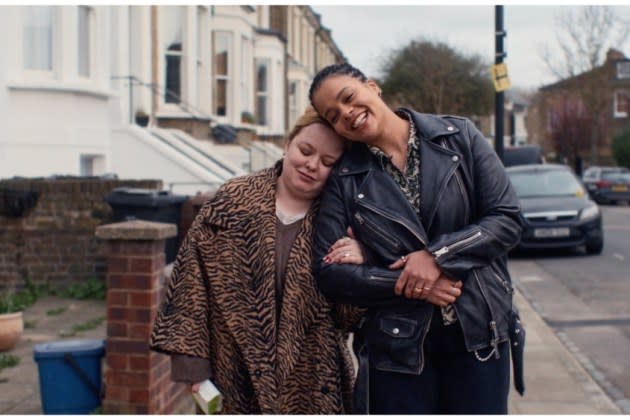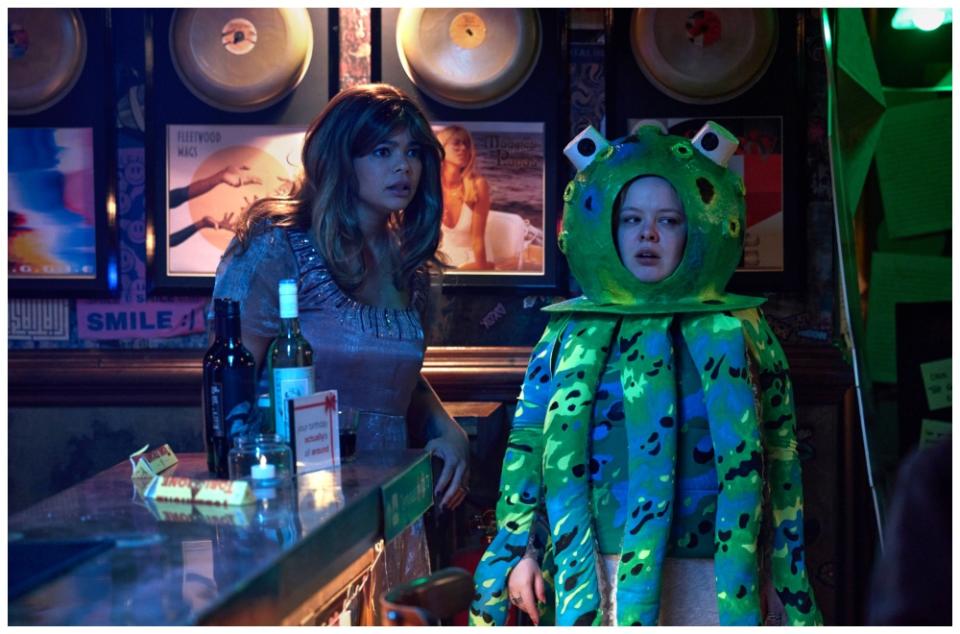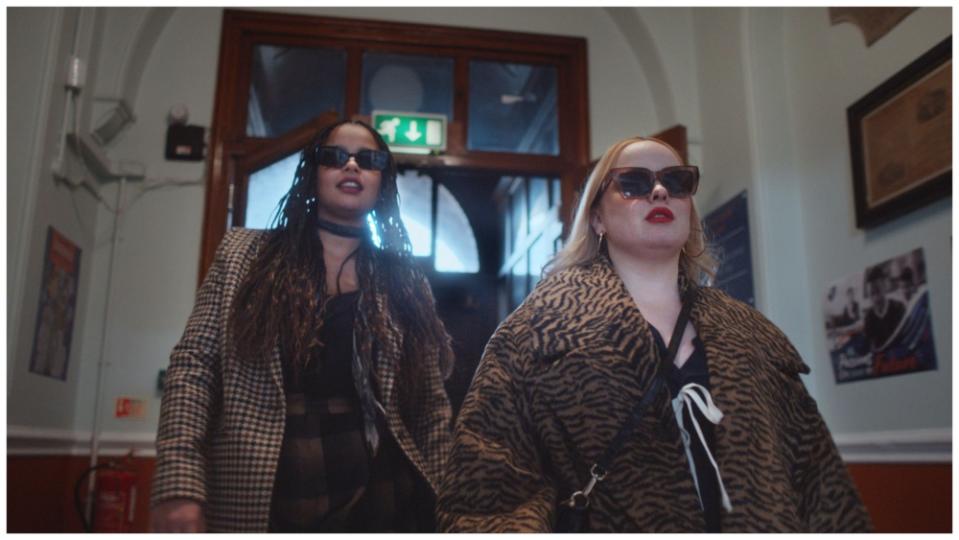Fremantle Delivers ‘Big Mood,’ Creator Camilla Whitehill, ‘Bridgerton’ Star Nicola Coughlan, ‘It’s a Sin’s’ Lydia West Break Down Comedy (EXCLUSIVE)
- Oops!Something went wrong.Please try again later.
- Oops!Something went wrong.Please try again later.
- Oops!Something went wrong.Please try again later.

A raucous comedy from playwright Camilla Whitehill, “Big Mood” teams “Bridgerton” and “Derry Girls” alum Nicola Coughlan with ‘It’s a Sin’ star Lydia West to dive headlong into mental illness and friendship. Fremantle, heading global distribution, will showcase the project in Cannes as part of its Mipcom slate. The market kicks off Oct.16.
A divinely sardonic and captivating laugh riot, the upcoming Channel 4 series presents an earnest portrait of mania and biologically-induced despair in a world where mental health has been commodified and sanitized for ease of consumption. Whitehill manages a highly nuanced depiction of Coughlan’s Maggie, whose bipolar pendulum swings erratically, as she tries desperately to regain control of her fleeting agency while clinging tightly to longtime friend Eddie, played by West.
More from Variety
“We’ve done a lot of patting ourselves on the back as a society, saying, ‘We’re really facing mental health,’ but we’re not. We’re okay with the stuff that isn’t scary, or that goes on behind closed doors. Mental illnesses that have side effects, or show themselves differently, we’re still just scared of what we don’t understand. Understanding mental illnesses outside of depression and anxiety, and understanding more about how people you know might be affected by the medication they’re on, can only be a good thing,” Whitehill told Variety.
“I’ve always seen people with mental illness portrayed as the dregs of society, detained by law enforcement or just troubled. Seeing someone with a functional life who’s also struggling deeply, it’s so important and it’s amongst all of us, especially in this generation. It’s such a good time for the show to come out, to open up those conversations again and normalize talking about it,” West added.
Directed by Rebecca Asher (“Dead to Me,” “Brooklyn Nine Nine”), the series opens as Maggie cruises down a London road on an electric scooter. Clad in a bright matching jumpsuit, blonde hair wrapped delicately in a chic scarf and face made-up proper, donning oversized sunglasses, her charisma is on full display. As she reaches her destination, she quickly abandons the ride by selling it to bystanders, rushing into the pub to meet Eddie, who calls her out on her rash behavior. The episode quickly establishes the co-dependent dynamic between the two as Maggie coaxes a reluctant Eddie to leave her responsibilities as bar owner behind to accompany her to a speaking engagement she abruptly set up at her old high school. Slyly deviant exploits ensue.
“It would be really hard to fake this friendship. If the friendship between Maggie and Eddie was strained, or you could tell it was a performed friendship, the audience wouldn’t believe it. They wouldn’t be as invested,” West stated.
An audience is likely to not only believe in the pair but become hastily enamored with the whole cast and the tempered chaos that surrounds them. From the tight-knit protagonists brimming with compelling traits, on through to characters on the periphery who pepper the already solid narrative with their own bonkers storylines, all contribute to arcs that beg a binge watch.
Rounding out the dynamic ensemble are Niamh Cusack (“The Virtues”), Eamon Farren (“The Witcher”), Luke Fetherston (“Flowers in the Attic: The Origin”), Kate Fleetwood (“Wheel of Time”), Rob Gilbert (“Big Boys”), Sally Phillips (“Veep”), Ukweli Roach (“Wolf”) and Amalia Vitale (“Willow”).
“This show is so dependent on the supporting actors for creating the world. Lydia and I talked about being on sets that aren’t supportive. How much that can trickle down. I know that we, as the leading actors, really wanted to create that welcoming environment for people coming in,” Coughlan stated.
“I don’t want to sound too saccharin, but it was an incredibly kind set. Everyone felt really supportive and supported,” she added.
Episode two sees Eddie lure a couch-bound and nearly catatonic Maggie out for a short birthday errand which turns into a surprise “Love Actually”-themed celebration at Eddie’s bar where friends spend hours ensuring Maggie doesn’t escape the costume-clad affair and rather, goad her to wade through the pleasantries her family, friends and special guest Joanna Page have in store. The push and pull of her mental illness grips each scene as the bar battles a pest problem and Maggie takes hallucinogens to cope with the anxiety that comes with an impromptu social exchange. The slightly trepidatious way she navigates the world becomes increasingly apparent.

Whitehill wrote the six-part script, which filmed in seven weeks, with a focus on these sorts of adult friendships, noting that this generation may be the first where it’s not inherent that someone winds up married with kids by 30. Everyone is off chasing a dream and those relationships are some of the most vital and fragile, as portrayed in each episode as Maggie and Eddie struggle through the grace period of her disorder and the limitations it puts on her ability to return Eddie’s unrelenting loyalty when it’s needed most.
“Your support network was traditionally your family. That’s not necessarily the case anymore. Your friendships are so important. But I don’t think they’re things that are often expressed with the same reverence as romantic or family love. My friendships and my female friendships are the most important thing in my world, they’re the things that got me through a lot. But when they break down, it can be as heartbreaking as a terrible breakup,” Whitehill relayed.
Transcending the collective ignorance surrounding mental illness, “Big Mood” delivers high-octane one-liners that mingle with the disease’s devastating tableau. Unapologetic and untempered, each scene serves to break from long-tired tropes. No broad strokes and no need to escape, the balance between heart wrenching and hilarious is masterfully curated. Running jokes litter the script providing a dose of reality, with laughter a common way to cope and digest trauma in monumental doses.
“Comedy is an incredibly effective way of storytelling without expressing a world or an experience that people might not understand, without it feeling too much like a learning experience. I’ve always had a really dark sense of humor, and I strongly believe that there’s very little you can’t make a joke out of,” Whitehill mused.
“I felt really supported in the writing process in terms of making comedy out of things that I think many people would have been a bit wary of me making comedy out of. Being able to do that, being able to commit to the tone that I wanted to commit to fully, has been such a joy,” she added.

Coughlan, who has maintained a close friendship with Whitehill since they attended drama school together, achieved an easy chemistry with West as well. West, who dazzled in HBO drama “It’s a Sin,” didn’t consider comedy her forte but wound up in supportive company alongside Coughlan, whose hysterical role as Clare in “Derry Girls” served to catapult her massive comedic abilities to global audiences.
“From that first read, it just felt very easy. That’s something you always hope for, that you don’t have to fill in a lot of the blanks. There weren’t really blanks with this show. I thought ‘yeah, this is all going to come together in the way that it needs to,” Coughlan stated.
“It was definitely challenging at some points because you wonder how you’re going to play a very depressed person who’s also very funny. Obviously the writing is hilarious, but it’s finding that balance,” she added.
“I’m a drama girl through and through. I love a bit of drama. I was quite nervous to step into such a funny comedy because I’d done an American comedy, but it didn’t have the same British sensibility and it wasn’t sarcastic or dry. They gave me so much confidence,” West admitted. “Watching the edit of the show, seeing where we go from episode one, it’s amazing to feel that spectrum of emotion, for a show to do that,” she added.
The series is executive produced by Laurence Bowen (“The Responder”) and Chris Carey (“Crossfire”) at Fremantle’s Dancing Ledge Productions and Lotte Beasley Mestriner (“The Young Offenders”) and produced by Georgie Fallon (“The Following Events are Based on a Pack of Lies”).
Commenting on its broad appeal and poignant subject matter, Jens Richter, CEO commercial and international at Fremantle, stated that “‘Big Mood’ is a beautiful, highly original, entertaining show. It uniquely balances such a profound topic with genuine laughter and fun, which is unseen. It’s amazingly put together. The incredibly talented cast is stellar – and only this kind of cast allows for finding the right on-screen balance and chemistry.”
He added, “The underlying topic is hugely important and much more common than people might think, making it very relevant globally.”
Best of Variety
Sign up for Variety’s Newsletter. For the latest news, follow us on Facebook, Twitter, and Instagram.

